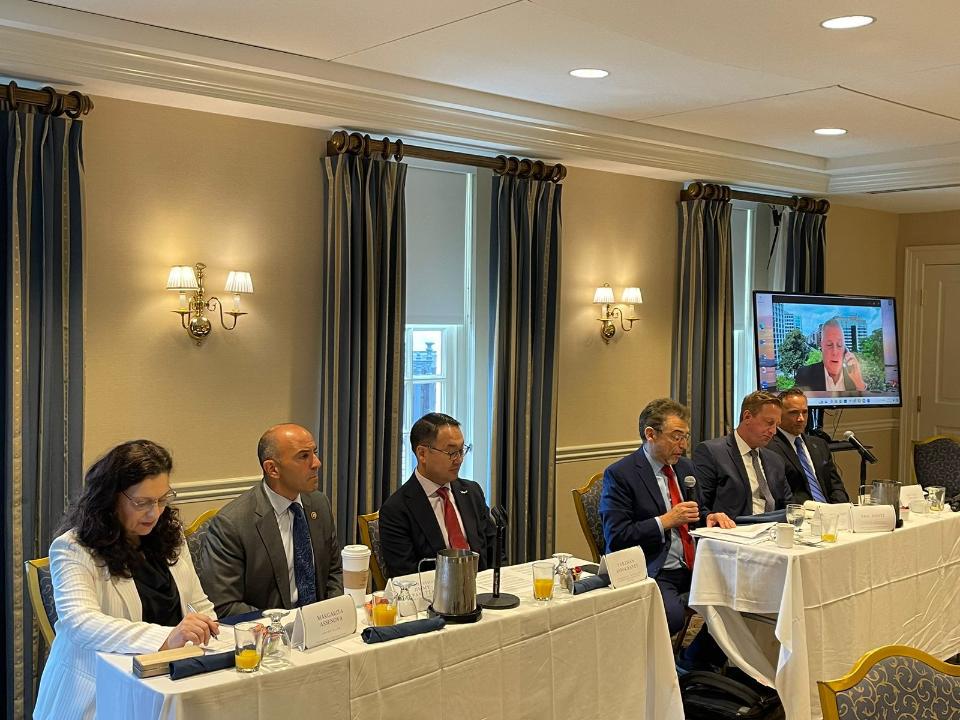WEB DESK: Washington, D.C., hosted a roundtable discussion on July 24 to explore American trade and investments in Central Asia.
The International Tax and Investment Center and the Center for International Private Enterprise organized the event, which gathered representatives of American businesses, the United States Congress, the expert community, and diplomats.
Congressman Jimmy Panetta, who is also the сo-сhairman of the Kazakhstan-American Caucus in the House of Representatives, and Joe Wilson, the chairman of the House Foreign Affairs Committee’s Subcommittee on the Middle East, North Africa, and Central Asia, attended the roundtable.
Permanent normal trade relations
American lawmakers expressed support for strengthening economic ties with Central Asia and reaffirmed their willingness to assist in initiatives aimed at increasing prosperity and economic stability in the region.
They advocated for the establishment of permanent normal trade relations between the United States and Kazakhstan, as well as other countries in the region. In May 2023, Jimmy Panetta, along with other congress members, introduced the bipartisan Kazakhstan Permanent Normal Trade Relations Act of 2023. This legislation aims to repeal the Soviet-era Jackson-Vanik Amendment, which deprives Kazakhstan of permanent normal trade relations with the United States.
Top investor
The United States is one of the largest investors in Kazakhstan’s economy. According to the Kazakh Ministry of Trade and Integration, trade turnover surpassed $4 billion in 2023, marking a 33% increase from the previous year. Between January and April 2024, trade turnover reached $1.4 billion, 17.3% higher than the same period in 2023.
Key sectors attracting investment cooperation include finance, energy, retail, mechanical engineering, mining, transport, communications, pharmaceuticals, and real estate. At least 600 joint ventures and companies with American capital operate in Kazakhstan.
Addressing the event, Kazakhstan’s Ambassador to the United States Yerzhan Ashikbayev stressed critical minerals, agriculture, and IT technologies as promising areas to explore.
“For the past three decades, the United States has been looking at Central Asia through different lenses – through the lenses of Afghanistan and counterterrorism, Iran, Russia, and China. But please recognize this is a 70-80 million region with huge potential. U.S. private companies have been part of this development story from the early beginning,” said Ashikbayev.
Multi-vector foreign policy
He emphasized Kazakhstan’s strategic commitment to a multi-vector balanced foreign policy, which has proved to be an effective mechanism of interaction with international partners. He noted that Astana is building pragmatic relations with all global players, including the United States.
Having constructive, stable, predictable relations with neighbors is a natural necessity, he said.
“Don’t forget when we are talking about Central Asia, we are talking about the biggest landlocked region in the world. Kazakhstan is the biggest single landlocked country. It is not only natural, but it is a necessity for us, a natural necessity for Kazakhstan. That said, I want to reiterate this policy that we have. It is not only multi-vector, it is a great gain policy,” said Ashikbayev.
The partnership is diversifying with new production facilities opening up. One of them is the construction of A PepsiCo plant in the Almaty Region.
“We are trying to meet the needs of our partners as much as we want our partners to meet our needs. So we are talking about global infrastructural development to ensure the viability of supply chains. We are talking about rare earth minerals. Let me give you just one figure, half of the global production of natural uranium is concentrated in Central Asia. (…) Overall, we are talking about looking at Central Asia while recognizing its own merits,” said Ashikbayev.
Vitally important countries
Ariel Cohen, a managing director at the ITIC Energy, Growth & Security Program, said it is imperative to recognize “how vitally important these countries are,” referring to Central Asia.
“The legacy investment into oil is still quite high, especially in Kazakhstan. But we are lagging in trade, and there is no reason why we shouldn’t have more investment in transportation corridors that these countries are developing east and west, in agriculture, that has tremendous potential in Kazakhstan, in biotech and fintech,” said Cohen.
“It is an emerging market with an educated and talented population and American companies would be amiss if we didn’t invest and if we didn’t trade,” he added.
Recent years have witnessed increased contacts and visits between the United States and Central Asia politically and economically. In September 2023, New York hosted the first-ever presidential summit of American and Central Asian leaders in a C5+1 format. Launched in 2015, this is a regional diplomatic platform aimed at enhancing coordination between the United States and Central Asia.
In March, Almaty hosted the B5+1 Forum, the private-sector-led counterpart to the C5+1 diplomatic platform. The forum brought together more than 250 business leaders, investors, policymakers, and experts to discuss the challenges and opportunities of doing business in Central Asia. The platform is an important outcome of the C5+1 presidential summit.


